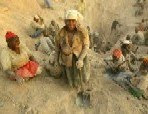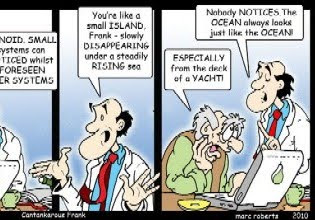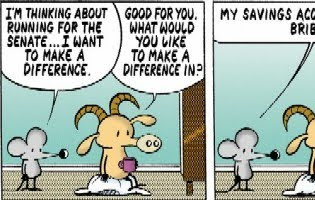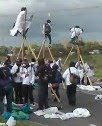Up, Down, Appendices, Postscript.
When it comes to taking hold of someone, hair is good. There are other anatomical possiblilities, and then some not-so-anatomical ones. In Beckett's Murphy f'rinstance, Neary says, "Here are the pudenda of my psyche." Those may serve too for taking hold of eh?



 I didn't vote for Rob Ford (though I secretly wanted to). And then when I heard the 'the-gravy-train-stops-here' whistles blowing at his victory party a thrill went up my spine and I was glad he won.
I didn't vote for Rob Ford (though I secretly wanted to). And then when I heard the 'the-gravy-train-stops-here' whistles blowing at his victory party a thrill went up my spine and I was glad he won. A few points in his favour: he's not smug, and he's not smooth. So then ... let's see if he delivers on stopping that gravy train shall we?
A few points in his favour: he's not smug, and he's not smooth. So then ... let's see if he delivers on stopping that gravy train shall we?Here's some wishful thinking & pundit jizz on the subject. Here he is on As It Happens ... the joke's on Carol Off this time, hahaha, she doesn't like being cut off, poor wee thing. But I did think I could hear the sound of teeth-gnashing correctitude in the background and I bet the CBC will be gunning for our Rob Ford in the days to come.
Election turnouts: 2003 - 40% (Ontario average), 2006 - 39% (Toronto), 2010 - 53% (Toronto). Worth comparing with the last Federal election in 2008 - 59%, the lowest turnout ever they say, and the lowest of the low: 48% in Newfoundland.
 So what we have got is that in k-k-Canada at least, less than half of less than half of the people decide the issue these days ... that comes to about 20%. Even less if you consider those who continue disenfranchised one way or another way - the praeterite that's to say, as compared with the elect.
So what we have got is that in k-k-Canada at least, less than half of less than half of the people decide the issue these days ... that comes to about 20%. Even less if you consider those who continue disenfranchised one way or another way - the praeterite that's to say, as compared with the elect.That's where Gable's editorial cartoon misses. He's got the isolated ideologies right, but the 50% who didn't vote are nowhere to be seen.
The OED tells me that 'smug' derives from 'schmuck' etymologically, the change from k to g being noted as 'very irregular' ... so ... And among the OED citations is Thomas More's quote (included as the subtitle to this post above, taken from a longer excerpt below) from the preface to his Utopia.



 'Smuk' in Danish is 'beautiful' ... and I think of Smucker's jam. A-and also ... Thomas Pynchon had a specific meaning for 'schlemiel' being someone who simply could not get along with the physical universe (machines in particular as I remember it).
'Smuk' in Danish is 'beautiful' ... and I think of Smucker's jam. A-and also ... Thomas Pynchon had a specific meaning for 'schlemiel' being someone who simply could not get along with the physical universe (machines in particular as I remember it). Thomas More puts quite a heavy moral judgement in what he is saying. But in Yiddish (as I understand it), being a schmuck or a schlemiel does not make you a bad person.
Thomas More puts quite a heavy moral judgement in what he is saying. But in Yiddish (as I understand it), being a schmuck or a schlemiel does not make you a bad person.
 Well, the k-k-Canadian government managed to defeat John McKay's Bill C-300. Not by themselves mind you - they had the connivance of Liberal Party Leader (Leader?) Michael Ignatieff and Party Whip Marcel Proulx. There were rumours and reports in the Globe and Mail that Ignatieff was against it, and then there were proofs - he did not even show up for the vote. I can do no less than honour John Mckay with a few pictures - despite he is a lawyer (with a bona fide lawyer's shit-eating grin), despite he is apparently some kind of k-k-christian, and despite he seems to lack discernment and shakes hands with people of questionable character.
Well, the k-k-Canadian government managed to defeat John McKay's Bill C-300. Not by themselves mind you - they had the connivance of Liberal Party Leader (Leader?) Michael Ignatieff and Party Whip Marcel Proulx. There were rumours and reports in the Globe and Mail that Ignatieff was against it, and then there were proofs - he did not even show up for the vote. I can do no less than honour John Mckay with a few pictures - despite he is a lawyer (with a bona fide lawyer's shit-eating grin), despite he is apparently some kind of k-k-christian, and despite he seems to lack discernment and shakes hands with people of questionable character.And C-311 is coming to the fore again in the Senate. Bill C-311 is now at second reading in the Senate. Senators can debate the principle of the bill - indeed they must. The Conservative Senators have refused to participate in this debate so far, thus preventing it from moving on 'to committee' and stopping progress. Why it needs to go 'to committee' when it has already passed in the House of Commons is a question for which I have no answer.
The sticking points include that eminent elder feminist and past national chair of MADD - Mothers Against Drunk Driving (and I sincerely mean no disrespect to her personal loss here) Marjory LeBreton, the Conservative leader in the Senate, and Richard Neufeld, the Conservative point-man for C-311. If you are inclined to engage them on this issue you can find their email addresses by following the links directly above. They are trying to kill this bill with the death of a thousand cuts - one petty & sophomoric delaying tactic after another and mealy-mouthed sententious nonsense inbetween.
These people are called 'honourable' ... but I see no honour in 'em:












The first news from Nagoya came to me (as usual) via Brasil: Encontro da ONU fecha acordo para conter destruição da natureza, and then over to The Guardian to make sure my rudimentary Portuguese had not fooled me.
The Guardian writer cynically notes, "In the long run, the biodiversity deal scratched out in Nagoya in the early hours of this morning is intended to benefit habitats and species such as tigers, pandas and whales. But in the short-term, the biggest beast to get a reprieve may well prove to be the UN itself."
Maybe it's not cynicism at all though eh? You may have noticed that I have spent some hours as I compose this blog wondering what Dr. Strangelove fantasies our leaders must be indulging ... but the fantasies of bureaucrats are clear as water and smooth as silk - Keep those paycheques comin' in! - and they managed a milquetoast agreement at Nagoya because they feared personal extinction. Do they imagine that increasing protected areas and such like will have any effect? Bah!

 Kiyotaka Akasaka, United Nations Under-Secretary-General for Communications and Public Information, previously Deputy Secretary-General of the Organization for Economic Cooperation and Development (OECD), says, "Nagoya is a milestone agreement. It not only provides a new roadmap for protecting our biodiversity, it also puts forward a process that will allow people in local communities to benefit from the fruits of their knowledge of biodiversity that can be commercialized and made profitable. It also shows that, though difficult, the world can come together to achieve all of the Millennium Development Goals and meet the challenge of climate change."
Kiyotaka Akasaka, United Nations Under-Secretary-General for Communications and Public Information, previously Deputy Secretary-General of the Organization for Economic Cooperation and Development (OECD), says, "Nagoya is a milestone agreement. It not only provides a new roadmap for protecting our biodiversity, it also puts forward a process that will allow people in local communities to benefit from the fruits of their knowledge of biodiversity that can be commercialized and made profitable. It also shows that, though difficult, the world can come together to achieve all of the Millennium Development Goals and meet the challenge of climate change."here is little Effie's head
whose brains are made of gingerbread
ee cummings, probably sometime in the 50s.
Don't believe me? Here, read it and weep: First the hierarchy fol-de-rol: UNEP - United Nations Environment Programme, CBD - Convention on Biological Diversity, COP-10 MOP-05; and then the 'Aichi Target' including 20 headline targets, organized under five strategic goals (wait for it) ...
Oops ... can't find the actual signed protocol. I found what must be a draft which I have summarized below. Just read this one to get a taste, "Target #1: By 2020, at the latest, all people are aware of the values of biodiversity and the steps they can take to conserve and use it sustainably." Eventually I will find the final agreement maybe and post a link.
If you still don't think this is nonsense, just look at the verbs in these United Nations 'goals': address, mainstream (as a verb), reduce, promote, improve, enhance. QED.
Or consider the disconnect aroound percentages of numbers of species. David Suzuki tells me in his book Legacy that we have very little idea of the total number of species. So where do statements like "... today, the rate of loss of biodiversity is up to one thousand times higher than the background and historical rate of extinction." come from? The statement was by Ahmed Djoghlaf, Executive Secretary Of the CBD - Convention on Biological Diversity. How do you compute an average when the total is unknown?
I fell out with my colleague at 350 or bust, permanently I think. It was inevitable. Even so I am bereft.
Then yesterday afternoon as I was waiting for the 501 car at Queen & Yonge there was a drunk across the street raging. He reminded me of John Wayne's imaginary friend Tex in a western movie I must've seen sometime. Hanging onto a lamp post and yelling at a woman who was not present, calling her every name in the book like an advertisement for Tourette's: Cunt! Bitch! Whore! Slut! Though I noticed he was careful not to directly address his tirade at any specific woman crossing the street at the time.
I've been there a couple of times. Nothing broken is ever really fixed, things just change. If I can find John Wayne's Tex I will post it.

 Like the Stones' 'jaded faded junkie nurse' I am long since overwhelmed and despairing ... I read a review of Keith Richards' new memoir. The reviewer thought Richards revealed himself as a gentleman, particularly around women. And on the strength of that I guess I will just let them take me on outa' here with a few bars of Let It Bleed.
Like the Stones' 'jaded faded junkie nurse' I am long since overwhelmed and despairing ... I read a review of Keith Richards' new memoir. The reviewer thought Richards revealed himself as a gentleman, particularly around women. And on the strength of that I guess I will just let them take me on outa' here with a few bars of Let It Bleed.Be well.
Postscript:



 Kwesi Abbensetts keeps a blog of his photographs where he reveals what seems to me a rare sensibility and talent.
Kwesi Abbensetts keeps a blog of his photographs where he reveals what seems to me a rare sensibility and talent.And then occasionally he forays into a realm somewhere between photography and literature and another side shows up, you might say: callow, precious, sententious ... here's an example:
And yet it is quite a little story, nevermind my quibbles. You can see the photo montage here.A Little Story: Sometimes a muse appears, magic becomes real. The spell unwinds - A kind of Astonishment. She brings you enchantment. She pierces the hard heart. Promises are evoked between her lips of redwine dreams. When it was you and only you who Laid the trap to believe her illusion was real. She was your war.

 Palagummi Sainath is an Indian journalist. I came across his book at the library by mistake. The title is Everybody loves a good drought: Stories from India's poorest districts, and I thought it was fiction. A happy mistake ...
Palagummi Sainath is an Indian journalist. I came across his book at the library by mistake. The title is Everybody loves a good drought: Stories from India's poorest districts, and I thought it was fiction. A happy mistake ...And yet ... He is renowned for his photographs but the examples at the right are about the only ones I could find on-line. I watched a few videos and noted the same upper-caste arrogance I remember from Indians I met at university in the 60s - I could be wrong (but in the video link you will see that he explicitly admits it).

 In any event he tells the story of suicide among poor Indian farmers (the beneficiaries of wazzizname? the Nobel prize winner who died recently? ... Norman Borlaug) and he tells it eloquently. Take a close look at these two photogrphs. The hands are in defensive postures. These people are saying, "Don't look at me in this degrading predicament any more," and maybe too, "... unless you are going to do something about it."
In any event he tells the story of suicide among poor Indian farmers (the beneficiaries of wazzizname? the Nobel prize winner who died recently? ... Norman Borlaug) and he tells it eloquently. Take a close look at these two photogrphs. The hands are in defensive postures. These people are saying, "Don't look at me in this degrading predicament any more," and maybe too, "... unless you are going to do something about it."There is a film about him which you can purchase for $275 - and I cannot find any other way to see it - so for me it will remain unviewed. Very tempting to buy it and post it on IsoHunt.

 David Chen not guilty! The judge was as nasty as he could be, but that had nothing to do with anything I don't think except his wounded pride. If they had convicted this guy I am not sure they knew what they might be facing in the way of public revolt. The thief on the other hand, Anthony Bennett, is entirely invisible on the Internet - not a picture of him anywhere to be found. I wonder why since knowing what a thief looks like might be useful information. No pictures of the judge, Ramez Khawly, either ... (?)
David Chen not guilty! The judge was as nasty as he could be, but that had nothing to do with anything I don't think except his wounded pride. If they had convicted this guy I am not sure they knew what they might be facing in the way of public revolt. The thief on the other hand, Anthony Bennett, is entirely invisible on the Internet - not a picture of him anywhere to be found. I wonder why since knowing what a thief looks like might be useful information. No pictures of the judge, Ramez Khawly, either ... (?)Here's a story from Zimbabwe about diamond mining:





... when you're begging for a crumb.
Leonard Cohen, Waiting For A Miracle.
[and you are excused if you don't get the 'crumb' connection with ee cummings' poem quoted above]


 Two paintings around Parzival by Kelly Moore. For me, either one or both could be Parzival himself, though this is not what the artist had in mind I don't think. But they remind me of a painting by Chagall that I saw once at the Musée des beaux-arts on Sherbrooke Street in Montréal. I thought it was Moses coming down the mountain carrying the tablets. His face was green and there was an ineffable expression which I have always remembered. The only image I can find on-line that even reminds me of it is of Job. And the face I remember was looking to the left not to the right, and I remember that it was a huge canvas.
Two paintings around Parzival by Kelly Moore. For me, either one or both could be Parzival himself, though this is not what the artist had in mind I don't think. But they remind me of a painting by Chagall that I saw once at the Musée des beaux-arts on Sherbrooke Street in Montréal. I thought it was Moses coming down the mountain carrying the tablets. His face was green and there was an ineffable expression which I have always remembered. The only image I can find on-line that even reminds me of it is of Job. And the face I remember was looking to the left not to the right, and I remember that it was a huge canvas. Ah well, memory is so unreliable. People say, "eff this" and "eff that" ... I like to say ... ineffable.
Ah well, memory is so unreliable. People say, "eff this" and "eff that" ... I like to say ... ineffable.Everyone knows the story of Parzival, possibly Wagner's opera or maybe a Camelot story. The one I like is from before any of that, as written by Eschenbach, 12th century or so, very early literature indeed.
Parzival goes off looking for the grail, and after many adventures he gets very very close to it. He has a question in his mind but does not ask the question because ... well, who can say exactly why not? But he doesn't, so he fails. And then he has more travail and eventually finds himself again in front of the injured & dying king with the very same question in his mind. This time he asks it, and so finds the grail. Happy ending, king recovers, Parzival is reunited with his wife Condwiramurs, twins are eventually born (or was that before? I can't remember?) and so on ...
The question is very simple. It is this: "What ails thee?" So obvious and so human, which takes me on a meditation linking Blake's Poison Tree with both this story and the story of the Good Samaritan.
Appendices:
1. Thomas More to Peter Giles, 1516, Robynson's Translation, 1551.
2. Murphy, Samuel Beckett, 1938.
3. Whose suicide is it, anyway?, P. Sainath, June 25 2005.
4. Ignatieff’s mixed message on mining leaves Liberal heads spinning, Jane Taber, October 28 2010.
5. Encontro da ONU fecha acordo para conter destruição da natureza, Reuters, 29/10/2010.
6. Goodwill and compromise: Nagoya biodiversity deal restores faith in UN, Jonathan Watts, October 29 2010.
7. Judge finds David Chen not guilty; or, The Grocer Wore Grey, Peter Kuitenbrouwer, October 29 2010.
8. There’s good reason the masses are revolting, Margaret Wente, October 30 2010.
9. Revised And Updated Strategic Plan: Technical Rationale And Suggested Milestones And Indicators, Nagoya, October 29 2010.
Thomas More to Peter Giles, 1516, Robynson's Translation, 1551.
1. Internet Archive,
2. Google Books,
3. Uppsala University.
More to Peter Giles sendeth gretynge ...
Howbeit, to saye the verie truthe, I am not yet fully determined with meselfe, whether I wyll put forth my booke or no. For the natures of men be so diuers, the phantasies of some so wayewarde, theire myndes so vnkynde, theire iudgementes so corrupte, that they which leade a merie and a iocunde lyfe, followinge theire owne sensuall pleasures and carnal lustes, maye seme to be in a muche better state or case, then they that vexe and vnquiete themselfes with cares and studie for the puttynge forth and publyshynge of some thynge, that maye be either profett or pleasure to other; whiche neuertheles wyl disdaynfully, scornefully, and vnkyndly accepte the same. The moste parte of al be vnlearned: and a great numbre hath learnynge in contempte. The rude and barbarous alloweth nothynge but that which is verie barbarous in dede. If it be one that hath a lytell smacke of learnynge, he reiecteth as homely and commen ware whatsoeuer is not stuffed full of olde moughteaten wordes, and that be worne out of vse. Some there be that haue pleasure onely in olde rustie antiquities; and some onely in theire owne doinges. One is so sowre, so crabbed, and so vnpleasaunt, that he can awaye with no myrthe nor sporte. An other is so narrow in the sholders, that he can beare no iestes nor tawntes. Some selie poore soules be so aferd that at euery snappishe worde theire nose shalbe bitten of, that they stande in no lesse drede of euerye quicke and sharpe worde, then he that is bytten of a madde dogge feareth water. Some be so mutable and waueryng, that euery houre they be in a newe mynde, sainge one thynge syttynge, and another thynge standynge. An other sorte sytteth upon theire allebencheis, and there amonge theire cuppes they geue iudgement of the wittes of wryters, and with greate aucthoritie they condemne euen as pleaseth them euery wryter accordyng to his writinge; in moste spiteful maner mockynge, lowtynge, and flowtynge them: beynge themselfes in the meane season sauffe, and, as sayth the proverbe, out of all daunger of gonneshotte. For whye, they be so smugge and smoethe, that they haue not so much as one heare of an honest man, whereby one may take holde of them. There be moreouer some so vnkynde and vngentell, that thoughe they take great pleasure and delectation in the worke, yet for al that they can not fynde in theire hartes to loue the author therof, nor to aforde hym a good worde; beynge muche lyke vncourteis, vnthankefull, and chourlishe guestes, whiche, when they haue with good and deyntie meates well filled theire bellyes, departe home, geuynge no thankes to the feaste maker. Go youre wayes, nowe, and make a costly feaste at youre owne chargeis for guestes so deyntie mouthed, so dyuers in taste, and bisydes that of so vnkynde and vnthankefull natures.
Murphy, Samuel Beckett, 1938.
He sat naked in his rocking-chair of undressed teak, guaranteed not to crack, warp, shrink, corrode, or creak at night. It was his own, it never left him. The corner in which he sat was curtained off from he sun, the poor old sun in
"What are you doing in this kip at all?" said Wylie. "Why aren't you in Cork?"
"My grove on Grand Parade," said Neary, "is wiped as a man wipeth a plate, wiping it and turning it upside down."
"And your whiskers?" said Wylie.
"Suppressed without pity," said Neary, "in discharge of a vow, never again to ventilate a virility denied discharge into its predestined channel."
"These are dark sayings," said Wylie.
Neary turned his cup upside down.
"Needle," he said, "as it is with the love of the body, so with the friendship of the mind, the full is only reached by admittance to the most retired places. Here are the pudenda of my psyche."
"Cathleen," cried Wylie.
"But betray me," said Neary, "and you go the way of Hippasos."
"The Adkousmatic, I presume," said Wylie. "His retribution slips my mind."
"Drowned in a puddle," said Neary, "for having divulged the incommensurability of side and diagonal."
"So perish all babblers," said Wylie.
Whose suicide is it, anyway?, P. Sainath, June 25 2005.
In Yavatmal district alone, there's been an eight-fold increase in farmers' suicides in just four years. Yet, thanks to a flawed counting process, even that is a huge under-estimate. P Sainath continues his series on the agrarian crisis in Vidharbha.
25 June 2005 - "Now we can't even commit suicide in peace," laughs Digambar Agose's neighbour in Malwagad village. "Not without reading those forms the officials have created to see we get it right." Another pipes up: "There are some 40 clauses on their inquiry list. All these must apply." In short, if you must kill yourself, make sure you adhere to the pro forma.
Malwagad's graveyard humour aside, the implications are scary. Vidharbha has seen more debt-driven farmers' suicides than any other region in Maharashtra. This, despite the counting process being suspect and often simply wrong. "Our methods," admits one senior official, "work from the point of view of assessing compensation. That's all. Not to learn why the suicides happen." Which means under-counting is built into the process. Governments do not like paying out compensation.
Flawed figures
So a lot of suicides are not recorded as being debt-driven. Yet, even the flawed numbers are startling. In Yavatmal district alone, farmers' suicides went up from 17 in 2001 to 132 last year. An almost eight-fold increase in four years. Most occur between July and November. But there have already been 29 till May this year. This means there have been more suicides in the off-season this year than in all of 2001.
What numbers would a more honest process show? Sadly, even sensitive officers - and Yavatmal has a few - are trapped by the format. So while the ongoing agrarian crisis has spurred several hundreds of suicides across Vidharbha in a short span of time, we will never know their full extent. The counting process stands too corrupted.
Adivasi farmer Digambar Agose (debt: Rs. 70,000) killed himself this January in Yavatmal. His family got no compensation. Agose's suicide "did not meet the norms" set up by the Government to determine which is a "farmer's suicide" and which is not. The norms are baffling. Most local officials cannot say what they are. And the final judgment is often subjective.
It is the same in Buldhana district. "We had 84 farmers' suicides here in the last year," says journalist Narendra Lanjewar. "Just 14 of these have been compensated." That is one in six. Also, only those 14 will be counted as "farmers' suicides."
A survey by The Hindu of 10 suicide-hit households in three districts found major discrepancies. Families with more than twice the landholding of Agose - and fewer members - received compensation. The Agose household, sunk in misery, did not. In some cases, caste played a role. In others, elections. Polls were around the corner when some farmers died but were over when others did. Those affected before voting day were more likely to get help.
But other factors worked, too. At the top, says Yavatmal Collector Harshdeep Kamble, "we want to know: was the victim a farmer? Are there loans against his name? Did the banks issue him notices? What is the general condition of the family?"
Valid concerns. But the problems are many. The Government only takes note of bank and cooperative loans, though the vast majority get their credit from moneylenders. So very large numbers get excluded in the counting. The Government knows this. "First the banks give the farmers no loans," says an official. "And then their suicides are not counted because they have no bank loans. It was lack of bank credit that sent them to moneylenders in the first place."
Who is a farmer?
Next: who is a `farmer?' In every case, the suicide was that of the main breadwinner. But the land may not have been in his or her name. "My son ran the farm," says Sriram Jharekar in Isoli village, Buldhana, "I am 80 years old. However, the land is still in my name." So when his son Ganesh took his own life this January, there was no question of compensation. Ganesh, by the "norms," was not a farmer. He did not own land. Never mind that he was the only working farmer in the household. His infirm parents can do no work. But are "farmers." That is why when Prabhakar Katale took his life in Wardha, his aged father Shamrao settled his land on his remaining sons at once. Likewise, suicides by women farmers won't be counted. There is no land in their names.
The official inquiry checklist has some 43 indicators. Of these a few are routine. Name, age, sex, caste, address and the like. But there are over 35 others that also have to be gone through. When a suicide takes place, the local Talati reports it to the Tehsildar and assists him inquire into it. The latter reports to the sub-divisional magistrate. The SDM in turn reports to the Collector. In practice, subjectivity rules.
"They can decide this man died of `ill-health' or was a drunkard, or anything," says D.B. Naik in Bham village, Yavatmal. "Anything but debt." Naik, a kisan sabha leader here, mocks the process: "They want a signed statement from the victim that debt and [the] Government drove him to suicide."
A local official might also rule out aid to a family not "below the poverty line." The BPL process itself is bizarre. Digambar Agose's family lives in utter poverty. But it has no BPL card. As we leave the Agose home in Malwagad, we meet the new "Man of the House." Madhav Agose is 12 years old and in the eyes of his village "responsible for the entire household." Madhav works from 6 a.m. to 8 p.m. every day tending livestock. For Rs. 20 a day. Digambar's debts have to be paid. "And they got nothing as compensation," say the neighbours, "not even free seed in his father's name."
In the Pandher Kavada office of the Vidharbha Jan Andolan Samiti, another name is about to enter the "Register of Deaths." Abhay Shamrao Chavan, June 16, 2005. Independent groups, rejecting government figures, are tracking the tragedy. They know there will be many more. Ritesh Parchake, a leading journalist here who has reported the suicides for years, looks on sadly. "This is the season," he says wearily. "It's only just begun."
Ignatieff’s mixed message on mining leaves Liberal heads spinning, Jane Taber, October 28 2010.
Some Liberals are confused as to where their leader, Michael Ignatieff, stands on issues. Wednesday night was a good example.
Liberal Leader Michael Ignatieff, a human rights expert and former academic, indicated last week in caucus he was not in favour of a private member’s bill by Scarborough MP John McKay that called for Canadian mining firms to act ethically abroad or face sanctions, including being denied taxpayer funding.
In caucus this week, however, sources say he did not say a word about it. Instead his Whip, Marcel Proulx, was quietly encouraging Liberal MPs to stay away from the third reading vote Wednesday evening to ensure the bill would be defeated.
Some Liberals were perturbed that Mr. Ignatieff was inserting himself into private member’s business as many MPs view such legislation as their sole opportunity – amid all sorts of control measures by party officials – to practice democracy by voting freely.
Later in the day, perhaps fearing a bit of a backlash from MPs, Mr. Ignatieff’s office sent out a curious backgrounder and series of talking points regarding the bill to caucus members just before Wednesday’s vote. It seemed to suggest the Liberals were falling in line behind Mr. McKay’s proposal.
ISSUE: The House of Commons will vote on Liberal John McKay’s Private Member’s Bill C-300 today, which supports the principle of Corporate Social Responsibility for Canadian mining, oil and gas companies in developing countries.
KEY MESSAGES: Liberals recognize the importance of the mining, gas and oil industry to Canada. We believe that a commitment to Corporate Social Responsibility (CSR) – at home and abroad – makes good business sense and is a Canadian advantage. We are sending a strong message of the government that they cannot continue to ignore CSR for Canadian companies.
It then went on to note that this controversial bill could be improved in the Senate. Some Liberals thought this meant the party leadership was now in favour of the bill.
But it wasn’t to be. A short while later the bill was defeated thanks to a number of Liberal MPs, including Mr. Ignatieff, who did not show up to vote. Mr. McKay’s legislation was defeated 140 to 134.
Then, a few minutes after the vote, the Liberals sent out another release. “Despite the defeat of C-300, the Liberal Party remains committed to the important principle of corporate social responsibility for Canadian industries at home and abroad,” Mr. Igntaieff said in the statement.
He went on to talk about having an “open and transparent process” to deal with CSR issues. Not surprisingly, some Liberals were scratching their heads as to where Mr. Ignatieff actually stands on this issue.
It was reminiscent of the reversal Mr. Ignatieff made on employment insurance last month when he decided that measures for a broad range of enhancements to EI, included in a Bloc MP’s bill, were too expensive and no longer necessary. This, after he had vowed a year before to try to take down the Harper government because it would not make some of the same reforms.
Mr. Ignatieff said the bill was “not fiscally responsible” and he did not show up for the vote. However, his employment insurance critic, Mike Savage, supported the Bloc bill. In the end, it too was defeated.
Encontro da ONU fecha acordo para conter destruição da natureza, Reuters, 29/10/2010.
NAGOIA, Japão - Delegados de cerca de 200 países concordaram nesta sexta-feira com um amplo plano para frear a perda de espécies do planeta, ao estabelecerem novas metas para garantir até 2020 maior proteção da natureza e a conservação de seus benefícios para a humanidade.
Ministros do Meio Ambiente de todo o mundo também concordaram com normas de partilha dos benefícios de recursos genéticos da natureza entre governos e empresas.
Essa era uma questão-chave do comércio e propriedade intelectual, que poderá assegurar bilhões de dólares em novos recursos para nações em desenvolvimento.
Goodwill and compromise: Nagoya biodiversity deal restores faith in UN, Jonathan Watts, October 29 2010.
After the failure of the Copenhagen climate talks, a successful agreement to protect biodiversity has provided a timely morale booster.
In the long run, the biodiversity deal scratched out in Nagoya in the early hours of this morning is intended to benefit habitats and species such as tigers, pandas and whales. But in the short-term, the biggest beast to get a reprieve may well prove to be the UN itself.
After the misery, disappointment and anger of last year's climate talks in Copenhagen, the body was fiercely criticised and the entire multilateral negotiating process called into question. It seemed time-consuming, prone to grandstanding and dominated by selfish national interests rather than pressing global concerns.
At the start of this week, the talks in Nagoya looked likely to become another chapter in the same sorry story. But since then, there has been an impressive – and ultimately successful – willingness to work.
Square brackets (which denote areas of disagreement) have been steadily whittled away from the negotiating texts. Pragmatism has been more evident than ideology. Delegates actually seemed willing to listen to the advice of scientists warning of the perils of inaction.
Some key goals have been set, including a plan to expand nature reserves to 17% of the world's land and 10% of the planet's waters. For a scarred veteran of the Copenhagen or Tianjin climate talks, the extent of the progress, goodwill and readiness to compromise during these past few days has been pleasantly shocking. Right up to the final hour, there have been moments when the talks appeared on the verge of collapse. But negotiators have been flexible enough to skirt around the danger zone.
This is no accident. Ahead of this event – and not wanting to repeat the breakdown of last year's talks - the EU negotiating team was given a wider mandate. The same may be true of other nations.
That alone cannot explain why the results of Nagoya and Copenhagen were so different. Other factors include the smaller scale of this event and the expectations for it. There was less superpower pride and influence at stake: the United States is not a signatory and China has been relatively low-key. Brazil and the EU have bent over backwards to secure a deal. China and India have shown a willingness to compromise. Even Bolivia and Cuba complained but did not block.
The Japanese hosts also deserve a great deal of credit for the smooth organisation, though at times they have been almost comically hospitable in breaking up finelypoised negotiating sessions for food, drink and music receptions.
But the most important difference may be in implementation. One of the reasons why climate negotiations are so tetchy is because rival nations want stringent checks in place to make sure everyone complies and on course to realise their goals to reduce carbon emissions.
That is sadly not true for biodiversity targets, which tend to be vaguely worded and voluntary. Nature cannot complain if it gets cheated. This is a major reason why the last set of UN biodiversity goals were nowhere near being realised.
The drafters of the new Nagoya protocol say such lessons have been learned so a tighter road-map will be put in place that ties funds to progress, mobilises private finance as well as public funds and sees nature in terms of benefits to be shared rather.
One of the great achievements of this conference has been to highlight the fact that biodiversity is not just about saving a few cute animals, but about preventing risks to entire ecosystems, economies and ultimately human life. As a result, bird-lovers and tree-huggers have started to find common cause with insurers and investors.
In the conference centre last night, the mood was one of relief more than euphoria. But many expressed hope that this deal may provide momentum for the climate talks at Cancún next month. That seems optimistic.
It is too early too say whether Nagoya marks a turning point for UN multilateralism, let alone life on Earth. But for both, it is at least a much-needed morale booster.
Judge finds David Chen not guilty; or, The Grocer Wore Grey, Peter Kuitenbrouwer, October 29 2010.
In a cliffhanger ruling that mixed references to film noir and pulp fiction, Mr. Justice Ramez Khawly of the Ontario Court of Justice took two hours this morning, in a court packed with 100 people waiting on baited breath, to get to his ruling: David Chen, the vigilante grocer, is not guilty on all charges.
Justice Khawly, with references to James Cagney, Frank Capra, Richard Nixon, Emil Zola and George Orwell, spared nobody in his ruling — except perhaps the prosecutors. The judge unleashed barbed attacks on the press, the defendents and the defendent’s laywers. He accused many of attempting to manipulate public sympathy for the grocery to waylay the course of justice. At times he attacked and at times he defended the police but overall he called on the assembled to curb their criticism of Toronto’s justice system.
“Toronto the Good, like any other big city, has an underbelly that doesn not lead itself to a tourism marketing jingle,” Justice Khawly said. “The Toronto Tourism and Convention Bureau do not employ the Toronto police.”
“To blame police for not having pulled the charges is not an accurate reflection of the chain of command,” he added.
Police arrested Mr. Chen along with two other store employees, on May 23, 2009, and charged them with assault and forcible confinement after they caught a shoplifter and tied him up. During the months leading up to the trial, he became a hero not just to grocers in Toronto — who packed the court earlier this week during the closing arguments — but also to many across Canada. Two MPs have introduced private members’ bills in Ottawa with amendments to the citizens’ arrest provisions in the Criminal Code.
Justice Khawly attacked the grocer for testimony which he said strained credulity.
“Burdened by an English worthy of a Frank Capra film, [Mr. Chen] well knew that [crown prosecutor Eugene] McDermott would be gunning for him,” Justice Khawly said of the cross-examination of the greengrocer. “He had a story that did not quite hang together. He was trying to put his evidence in the best possible light. His testimony was full of evasions, contradictions and hardly credible assertions.” As to why the grocer bound the thief hand and foot, the judge said, “I am not sure I ever got a straight answer.”
But the judge said that the case also reflected an apparent police neglect of Toronto’s Chinatown. He made reference to the “broken windows theory,” noting, “when petty thefts are not deterred there is a corresponding decline in peoples’ sense of security.”
“David Chen tried to fill the void where the justice system failed,” he said, asking, “Could David Chen be after all the canary in the coal mine?”
And then he said the words all had waited for: “It is impossible for me to say that I am satisfied beyond a reasonable doubt” of Mr. Chen’s guilt. “The only conclusion I come to is that I have a reasonable doubt. All such doubts must resolve in favour of the defense. All charges against you are dismissed.”
Mr. Chen emerged from the courthouse slightly dazed, with a glowing smile on his face, wearing a fleece-lined grey hoodie, every inch the grocer. He had visited the Ontario Food Terminal early this morning, picking up three skids of kiwi, two skids of bananas, one skid of apples and one skid of cabbage. Kiwi is on sale at the Lucky Moose, $1.29 for a bag of 10.
“Thank you to all you people for all your support of me,” Mr. Chen told the crowd outside court. “It’s important for the Canadian Chinese community to speak out, and if people are united their voice will be heard.”
With that, he headed back to his store.
There’s good reason the masses are revolting, Margaret Wente, October 30 2010.
My best friends are wonderful people – talented, accomplished, generous, smart and caring. So it’s hard to see them in such fear and pain. The way they see it, the Visigoths have battered down the gates of Rome, and the Vestal Virgins had better scramble for cover. In the aftermath of Toronto’s election rout, their only consolation is that Rob Ford is probably too stupid and incompetent to completely sack the place. If only they lie low for the next four years, sanity will surely return to city politics.
Like my friends, the people who work in much of the major media – the CBC, the Toronto Star, even my own beloved paper – were stunned by the Ford tsunami. After all, the polls had predicted a squeaker. But there’s another reason they didn’t see the big wave coming. Very few of these people live or work outside downtown Toronto. Very few ever hang around with someone who voted for Mr. Ford and will own up to it. They remind me of the super-smart editorial writers at The New York Times who are sincerely convinced that Tea Partiers are dangerous crackpots – even though they’ve never met any.
The media think they understand why people voted as they did. As one Toronto Star pundit helpfully explained, the voters – Ford voters, that is – “were full of largely pointless rage.” Only pointless rage could explain why voters ignored the editorial endorsements of two leading newspapers, as well as a long line of former mayors who begged them, in the name of decency, to vote for George Smitherman. Even Justin Trudeau’s twinkle dust didn’t work.
The day after his election victory, Mr. Ford gave a hilariously disastrous interview to As It Happens, while simultaneously coaching a football game. It was obviously a mistake. It was also clear that, like most of his constituents, Mr. Ford doesn’t really give a darn about the CBC, never listens to As It Happens and believes that coaching his football team is far more important than talking to Carol Off. As much as I adore As It Happens, I find this moderately refreshing.
Tuesday, the U.S. Democrats will face their own tsunami. Like Toronto’s downtown liberals, they blame the masses, not themselves. The voters are full of pointless rage, they explain. Populist politicians (Tea Partiers, Rob Ford) have whipped up voter discontent with their simplistic slogans. These people are dangerous because their ideas, apart from being incoherent, are also unrealistic and destructive. And if they ever tried to implement them, they would wreck the place.
Both Barack Obama and outgoing Toronto mayor David Miller insist the voters simply don’t appreciate what they’ve accomplished. They say their only real mistake was to not focus enough on positive PR. Both the Democrats and Toronto liberals are convinced they know what’s best for the masses, even if the masses massively disagree. They believe that many of the people who vote for their opponents are basically deluded, ignorant and poorly educated (even though the Republicans are currently leading by 20 per cent among U.S. college graduates). They also believe the people on the other side are basically intolerant, anti-immigrant racists (even though a pre-election poll said half of voters born outside Canada were set to cast votes for Mr. Ford).
In other words, this is just another classic anti-incumbency wave, and all they have to do is ride it out.
The other possibility is that it’s something else. Could it be that the masses have good reasons for revolting?
Here are some. During the seven years Mr. Miller was in charge, Toronto’s spending increased by 44 per cent while services got worse. People grudgingly put up with the city’s unrelenting efforts to turn their porches into recycling depots. But they got seriously annoyed when they learned that striking city workers had better perks than they did.
In the United States, people’s lives have only gotten worse since Mr. Obama took office. Unemployment is higher. More than half of all families are worried about making next month’s mortgage or rent. Health-care reform is so impenetrably complex that people don’t know where they stand. What they do know is that their premiums have gone up and their Medicare coverage is being cut. Sixty-three per cent of Americans say they don’t feel they’ll be able to maintain their current standard of living. They know Mr. Obama didn’t create the mess, but they think he’s made it worse.
No wonder the independent voters who put Mr. Obama into office have deserted him. Fifty-five per cent of the electorate now say they are or lean Republican.
Americans believe their country is in crisis, and they’re right. By next year, the United States will reach Third World debt territory. Yet both major parties seem oblivious. Neither of them has a plan, or even publicly acknowledges the severity of the crisis. If the Tea Party does nothing else, it may at least force the Republicans to face this highly unpleasant fact. If Mr. Obama wants a second term, he’ll have to face it too.
Although Canada is far more blessed, even we won’t entirely escape the massive restructuring that faces almost every country in the Western world. The problem is simple. People have a lot more government than they can or will pay for. Mr. Ford and Tea Partiers know that. Scaling down the scope of government is the political challenge of the next generation. And if mainstream politicians stay in denial, they’ll be toast.
Revised And Updated Strategic Plan: Technical Rationale And Suggested Milestones And Indicators, Nagoya, October 29 2010.
Strategic goal A. Address the underlying causes of biodiversity loss by mainstreaming biodiversity across government and society.
Target 1: By 2020, at the latest, all people are aware of the values of biodiversity and the steps they can take to conserve and use it sustainably.Strategic goal B. Reduce the direct pressures on biodiversity and promote sustainable use.
Target 2. By 2020, at the latest, the values of biodiversity are integrated into [national accounts], national and local development and poverty reduction strategies and planning processes.
Target 3: By 2020, at the latest, incentives[, including subsidies,] harmful to biodiversity are eliminated, phased out or reformed in order to minimize or avoid negative impacts [and positive incentives for the conservation and sustainable use of biodiversity are developed and applied, [consistent with relevant international obligations]] , taking into account national socio-economic conditions.
Target 4: By 2020, at the latest, Governments, business and stakeholders at all levels have taken steps to achieve or have implemented plans for sustainable production and consumption and have kept the impacts of use of natural resources well within safe ecological limits.
Target 5: By 2020, the rate of loss and degradation, and fragmentation, of natural habitats, [including forests], is [at least halved][brought close to zero].Strategic goal C: To improve the status of biodiversity by safeguarding ecosystems, species and genetic diversity.
Target 6: [By 2020, overfishing is ended, destructive fishing practices are eliminated, and all fisheries are managed sustainably.] or [By 2020, all exploited fish stocks and other living marine and aquatic resources are harvested sustainably [and restored], and the impact of fisheries on threatened species and vulnerable ecosystems are within safe ecological limits].
Target 7: By 2020, areas under agriculture, aquaculture and forestry are managed sustainably, ensuring conservation of biodiversity.
Target 8: By 2020, pollution, including from excess nutrients, has been brought to levels that are not detrimental to ecosystem function and biodiversity.
Target 9: By 2020, invasive alien species are identified, prioritized and controlled or eradicated and measures are in place to control pathways for the introduction and establishment of invasive alien species.
Target 10: By [2020][2015], to have minimized the multiple pressures on coral reefs, and other vulnerable ecosystems impacted by climate change or ocean acidification, so as to maintain their integrity and functioning.
Target 11: By 2020, at least [15%][20%] of terrestrial, inland water and [X%] of coastal and marine areas, especially areas of particular importance for biodiversity and ecosystem services, are conserved through comprehensive, ecologically representative and well-connected systems of effectively managed protected areas and other means, and integrated into the wider land- and seascape.Strategic goal D: Enhance the benefits to all from biodiversity and ecosystem services.
Target 12: By 2020 the extinction and decline of known threatened species has been prevented and improvement in the conservation status [for at least 10% of them] has been achieved.
Target 13: By 2020, the loss of genetic diversity of cultivated plants and domestic farm animals in agricultural ecosystems and of wild relatives is halted and strategies have been developed and implemented for safeguarding the genetic diversity of other priority socio-economically valuable species as well as selected wild species of plants and animals.
Target 14: By 2020 ecosystems that provide essential services and contribute to health, livelihoods and well-being, are safeguarded and/or restored and equitable access to ecosystem services is ensured for all, taking into account the needs of women, indigenous and local communities and the poor and vulnerable.Strategic goal E. Enhance implementation through participatory planning, knowledge management and capacity-building.
Target 15: By 2020, ecosystem resilience and the contribution of biodiversity to carbon stocks has been enhanced, through conservation and restoration, including restoration of at least 15% of degraded ecosystems, thereby contributing to climate change mitigation and adaptation and to combating desertification.
Target 16: By 2020, access to genetic resources is [promoted] [facilitated] [enhanced], and benefits are shared consistent with national legislation [and the international [regime][protocol] on access and benefit-sharing, and the regime is in force and operational [and an access and benefit-sharing fund providing timely, adequate and predictable funds to developing countries, in particular the least developed among them, small island developing States and countries with economies in transition as a precondition for the fulfilment of their commitments under the protocol]].
Target 17: By 2020, each Party has developed, adopted as a policy instrument, and implemented, an effective, participatory and updated national biodiversity strategy and action plan.
Target 18: By [2020], [[have [sui generis legal] systems in place to protect] traditional knowledge, innovations and practices of indigenous and local communities that are relevant to biodiversity and their customary sustainable use of biodiversity are respected, preserved and maintained, and their contribution to the conservation and sustainable use of biodiversity is recognized and enhanced.] [The traditional knowledge and customary sustainable use relevant to biodiversity of indigenous and local communities are fully recognized and mainstreamed in the implementation of the Convention on Biological Diversity, its programmes of work and cross-cutting issues, at all levels.]
Target 19: By 2020, knowledge, the science base and technologies relating to biodiversity, its values, functioning, status and trends, and the consequences of its loss, are improved, widely shared and transferred, and applied.
Target 20: By 2020, capacity (human resources and financing) for implementing the Convention has increased [tenfold].





































